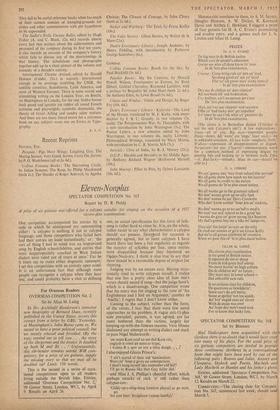Eleven-Nonplus
A prize of six guineas was offered for a calypso suitable for singing on the occasion of a 1957 eleven-plus examination.
ONE competitor accompanied his entries by a note in which he anticipated my commenting either : 'a calypso is nothing if not in calypso language, and those competitors who failed here had their entries set Aside immediately,' or : 'the sort of thing I had in mind was an improvised song by English schoolchildren, and entries that were inappropriately couched in West Indian dialect were ruled out of court at once.' Far be it from me to make either dogmatic comment; I set this competition with an entirely open mind. It is an unfortunate fact that although most people can recognise a calypso when they hear one, and could probably have a shot at defining
one, an actual specification for this form of folk- song is rather hard to come by. It is, on the whole, rather easier to say what characteristics a calypso should not possess. Disregard for scansion is generally agreed, but in most calypsos I have heard there has been a fair regularity as regards the number• of syllables per line; some entries were disqualified because they bordered on Ogden-Nash-ery. I think it also true to say that there should be a reasonable degree of respect for rhyming.
Judging was by no means easy. Having occa- sionally tried to write calypsos myself, 1 realise that one has a pretty clear idea of how one's verses should sound if sung—but the judge hasn't, which is a disadvantage. One competitor wrote that his entry was for singing to the tune of 'An Englishman and I had an Argument,' another to `Anella'; I regret that 1 don't know either.
Coming to the subject, rather than the form, of the verses, I fear that there were few novel approaches to the problem. A vague anti-11-plus note prevailed; parents, it was agreed, are far more bothered than the victims, largely for keeping-up-with-the-Joneses reasons. Vera Mouse disdained any attempt at writing dialect and stuck to pure Nigel Molesworth :
'me mum Kant read an me dad Kant rite, englysh is roten an sums ar trype, i wanna B a spiv an aye a lotta duogh. .
I also enjoyed Gloria Prince's : 'I ain't scared of their old 'xamination; Worryin"bout it gives me constipation;
I shan't hang myself like remember old Sid?
I'll go to Russia like that Guy feller did'
—and Miss J. S. Phillips's cheerful effort, which perhaps smacks of rock 'n' roll rather than calypso-ism :
`Giddy-up-a-ding-dong (context please) or• go man, go.
See you later, Invigilator (repeat loudly).'
Honourable mentions to these, to A. M. Sayers, Douglas Rawson, A. W. Dicker, R. Kennard Davis and Anthea C. Hewison. I suggest a prize of four guineas for H. A. C. Evans's painstaking and erudite entry, and a guinea each for J. A. Lindon and Allan M. Laing.
PRIZES (14. A. C. EVANS)
De big men-in de British nation Which care de people's education twine see who-all done know fo' troo In de 'tem plus examination.
Chorus : Unna bring rule an' pen an' lead,
Set dung good an' use yo' head
Else yo'-all gwine stan' sticky instead In de lem plus examination.
Dey say de chill un an' dere relation' All two both fill' wid boderation, Cry wulloss, ain't no-person get t'roo De 'lent plus examination.
Man, ain't no use chupsin' wid vexation Effin yo' bad-lucky don' get impatien' Yo' must be can l'ink what yo' gwineter do In de lem plus examination.
[The above is in Barbadian dialect (Trinidad is not the sole Calypso's isle!). A few explanations : Unna—all of you. Big men—important people., Dung—down. All `owns' are `tins.' Stan' sticky—be'. in awkward situation. All two both—emphatic 'both!: lilulloss—expression of disappointnient or disgust. No-person—no one. Chupsin'—onomatopoeic word for a common 'method of expressing disgust by pouting lips and sucking air in between teeth. Elfin —if. 'Bad-lucky—unlucky. Must be can—should be able to.]
(J. A. LINDON)
We ain' gonna stay 'way from school this mornin' We all gotta show how much we bin learnin' We all gotta be credit to the nation
We all gonna do le'm plus exam'nation.
We all wanna go to the grammar school We don' wanna grow up no silly fool We don' wanna be jus' Davy Crocketts Who don' know nothin"bout jets an' rockets.
We don' wanna go to no sec'nd'ry mod'n We wan' our nex' school to be a good 'un I wanna do gym an' grow strong like Samson My dad's gonna buy me a bike wi' lamps on.
They ain' bin lettin' us turn on the telly Or read our comics or• go'n see Grace Kelly But we're all gonna celebrate th' occasion When we pass this ol"le'm plus exam'nation.
(ALLAN M. LAING)
Dis eleven-plus examination Is for good of British nation. It separate de clever sheep From de kid-goats half asleep. No more wastin' no high culture On de children wit' no future : Dey must stay in lower school- Dat inflexible new rule.
Is an anxious time for• children, Dc questions so bewilderin'. Some can't do arit'metic, Some at spellin' not too quick, An' bon' stupid ones an' clever Wish de exam was over An' hope dey won't need wait For to know deir lucky fate.


































 Previous page
Previous page